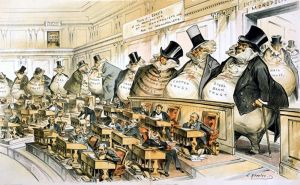Corporatism
Corporatism: Unveiling the Intricacies of Late Stage Capitalism
In the realm of late-stage capitalism, the ideologies of corporatism and consumerism have become deeply ingrained. These concepts intertwine to shape our perception of power, often leaving us feeling powerless as mere consumers. This article delves into the essence of corporatism, highlighting its relationship with consumerism and how they collectively contribute to the functioning of the capitalist system.
The Power of Corporatism:
Corporatism, as an ideology, emphasizes the dominance and influence of large corporations in shaping societal structures. It revolves around the belief that corporate control is not only a sign of progress but also an integral part of capitalism itself. This ideology operates under the premise that businesses and corporations should play a central role in decision-making processes, shaping policies, and driving economic growth.
Consumerism: An Inevitable Outcome:
Consumerism, on the other hand, is a phenomenon closely intertwined with corporatism. It thrives on the notion that individuals exist primarily as consumers, constantly encouraged to acquire and consume goods and services. This relentless pursuit of material possessions and the validation derived from consumption perpetuates the narrative that our worth is tied to what we can buy, rather than our inherent value as human beings.

The Illusion of Power:
Both corporatism and consumerism subtly feed into the narrative that individuals have limited power within the system. Corporatism suggests that corporate control is necessary for progress, effectively sidelining the voices and concerns of ordinary people. Consumerism further reinforces this notion by promoting the idea that our role is solely to consume, rendering us passive participants in the economic framework.
Designed to Maintain the Status Quo:
It is essential to recognize that this system is not broken; it functions exactly as it was designed to. Corporatism and consumerism work hand in hand to perpetuate the existing power structures, benefiting those at the top while limiting the agency of the masses. The illusion of choice and freedom within the capitalist framework often masks the underlying mechanisms that consolidate power and wealth.
Breaking the Chains:
Understanding the intricacies of corporatism and consumerism is crucial for navigating the complexities of late-stage capitalism. By questioning and challenging the dominant narratives imposed upon us, we can begin to reclaim our power as individuals. Recognizing the value beyond our role as consumers and actively participating in collective movements can disrupt the system and foster alternative frameworks that prioritize social and environmental well-being.
Conclusion:
Corporatism and consumerism shape our perception of power and limit our agency within late-stage capitalism. By recognizing the underlying mechanisms at play and questioning the prevailing ideologies, we can strive for a more equitable and sustainable society. It is essential to challenge the notion that we are merely consumers, embracing our inherent worth as individuals and actively engaging in shaping a system that prioritizes the well-being of all.
